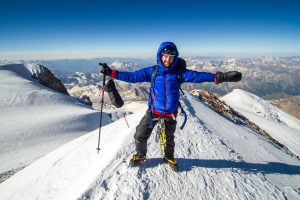
Tips for Altitude Sickness Prevention
Altitude sickness describes several symptoms that happen to your body when you’re exposed to a higher elevation within a short period of time. Here are some of them:
- Headache
- Nausea and vomiting
- Dizziness
- Tiredness
- Loss of appetite
- Upset stomach
- Feeling unsteady
- Shortness of breath
- Increased heart rate
- Difficulty sleeping
Altitude sickness is common when people are travelling and either climbing or being transported to a higher elevation quickly. The higher you climb, the lower the air pressure and oxygen levels get. Our bodies can handle the shift, but they need time to gradually adjust.
Here are some things you can do to prevent yourself from getting altitude sickness.
1. Climb slowly
Your body needs about two to three days of slowly going higher in order to adjust to the changes. Avoid flying or driving directly to high altitudes. Instead, go up higher each day, stop to rest, and continue the next day. If you have to fly or drive, pick a lower altitude to stay at for 24 hours before going all the way up.
When travelling on foot, plan your trip up with stopping points at lower elevations before reaching your final destination. Try to travel no more than 1,000 feet each day, and plan a rest day for every 3,000 feet you go higher.
2. Eat
It’s not often we’re told to eat extra. But when you’re at a higher altitude, you need more calories. So pack plenty of healthy snacks, and eat as much as you can at meal times.
3. Avoid alcohol
Alcohol, cigarettes, and medications like sleeping pills can make altitude sickness symptoms worse. Avoid drinking, smoking, or taking sleeping pills during your trip to higher altitude.

4. Drink water
Staying hydrated is also important in preventing altitude sickness. Drink water regularly during your climb. Drinking four litres a day is the normal guideline. To make this easier drink one litre when you wake up and another after breakfast, this gives you plenty of time to get the other two litres into you while walking during the day and at lunch and dinner.
5. Take it easy
Climb at a pace that’s comfortable for you. Don’t try to go too fast or engage in exercise that’s too strenuous.
6. Acclimatisation days
Try and do a day hike that takes you to a higher elevation than where you will sleep the next day to try and get used to the heights better. We have these built in on our itineraries already.
7. Sleep lower
Altitude sickness usually gets worse at night when you’re sleeping. It’s a good idea to do a higher climb during the day and then return to a lower altitude to sleep, especially if you plan on climbing more than 1,000 feet in one day.
8. Medication
There’s some evidence that taking acetazolamide (Diamox) two days before a trip and during your trip can help prevent altitude sickness.
Acetazolamide is a medication typically used to treat glaucoma. But because of the way it works, it can also help prevent altitude sickness. You’ll need a prescription from your doctor to get it.
It’s also important to know that you can still get altitude sickness even when taking acetazolamide. Once you start having symptoms, the medication won’t reduce them. Getting yourself to lower altitude again is the only effective treatment.
No one can promise you that this will make sure you do not get AMS, but it certainly doesn’t hurt.
9. Honesty
It is very easy to stay on top of your altitude problems if you are open and honest with yourself and your guides when hiking. Sometimes symptoms can be caused by other things like not drinking enough water or not eating enough.
We have some of the most experienced guides and mountain leaders in the world, working with us.
So if you have any questions about altitude and its effects please contact us, and we will help you as best we can.






